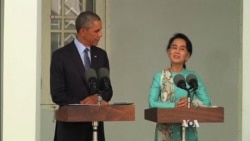President Barack Obama has wrapped up a visit to Myanmar, also known as Burma, warning that reforms in the country are “by no means complete or irreversible.”
The president stopped in Yangon and met with opposition leader Aung San Suu Kyi, the Nobel Peace laureate who spent years under house arrest when Myanmar was under military rule.
Aung San Suu Kyi met the president in the house by a lake where she was confined. After a warm embrace in front of cameras, the two spoke with reporters.
Obama repeated a warning that he had also given to Myanmar President Thein Sein one day earlier.
“It’s clear how much hard work remains to be done and that many difficult choices still lie ahead. The process for reform is by no means complete or irreversible. For many, progress has not come fast enough or spread far enough,” said Obama.
The president was critical of a constitutional rule that bars Aung San Suu Kyi from running in next year’s presidential elections because her children are British citizens.
Rohingya
Obama brought up U.S. concerns of how Myanmar treats members of its minority Muslim Rohingya population. Most are denied citizenship. Following clashes with Buddhists in Myanmar’s Rakhine state in 2012, thousands of Rohingya have been displaced, many confined to squalid camps.
The subject is politically sensitive among Myanmar’s Buddhist majority. Aung San Suu Kyi has received criticism for not taking a stand on whether the Rohingya should be granted citizenship. On Friday, when answering an American journalist’s question on the Rohingya situation, she cited the importance of the rule of law.
“If you ask how do we propose to resolve all these problems of violence between communities, between different ethnic groups, we’ve got to start with rule of law. People have to feel secure before they can start talking to one another. We cannot achieve harmony without security. People who feel threatened are not going to sit down and sort out their problems,” she said.
President Obama said ensuring that all of Myanmar’s people’s voices are heard in the political process is crucial to the country’s transition to a full democracy. He said the United States is paying attention to how religious minorities are treated in Myanmar.
“I am a firm believer that any legitimate government has to be based on rule of law and a recognition that all people are equal under the law and discrimination against the Rohingya or any other religious minority, I think, does not express the kind of country that Burma over the long term wants to be,” said Obama.
This was President Obama’s second visit to Myanmar. His first was in 2012, two years after elections marked the end of military rule that spanned a half-century.





